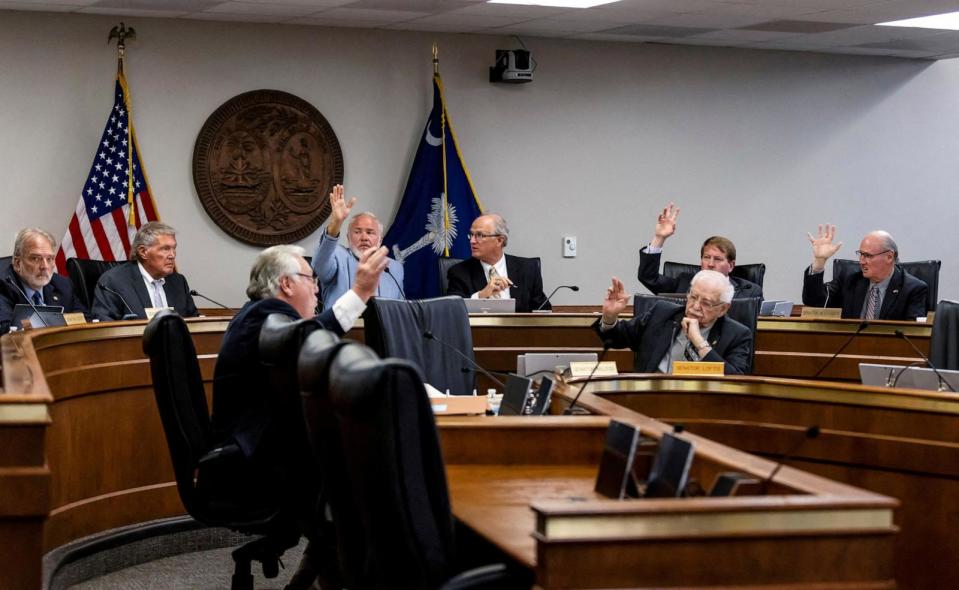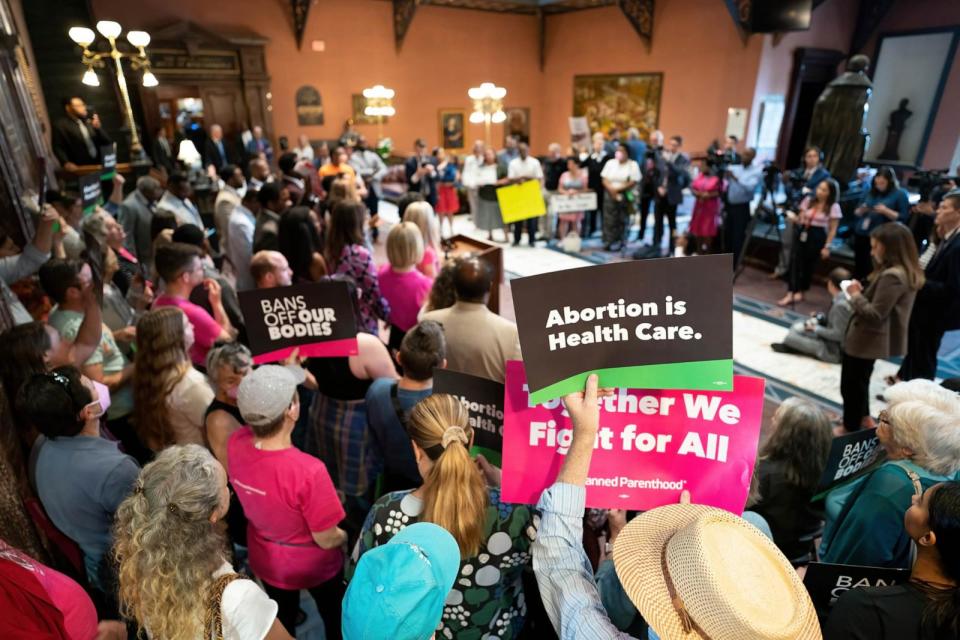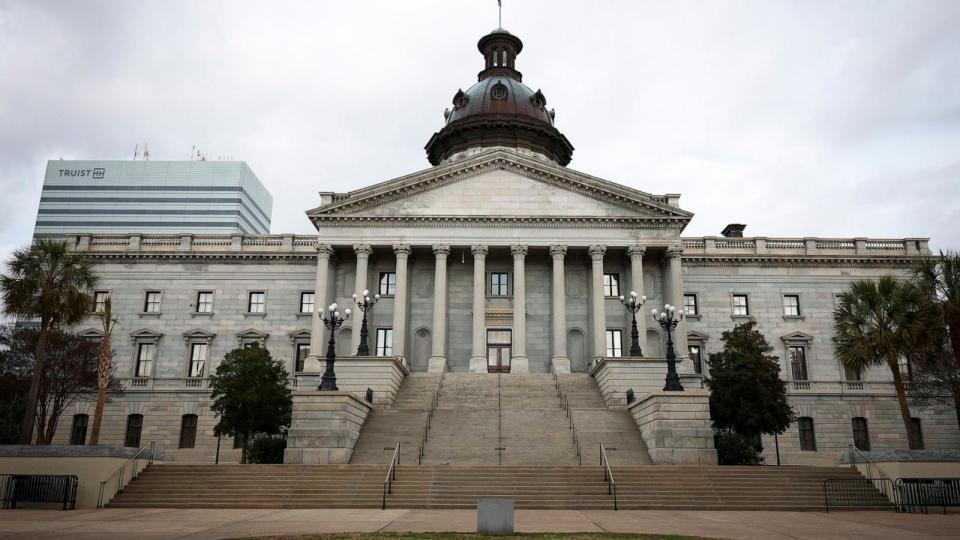South Carolina bill would offer compensation to women denied abortions
A South Carolina bill would offer women who would have sought abortion care, if not for the state's ban, compensation for continuing their pregnancies to term. The proposal is currently being considered by a South Carolina Senate subcommittee.
The bill, called the South Carolina Pro Birth Accountability Act, will require the state to provide women who would have obtained abortion care if not for the ban with "reasonable living, legal, medical, psychological, and psychiatric expenses that are directly related to prenatal, intrapartal, and postpartal period," according to the bill.
"It provides just compensation to women and girls who are eligible under South Carolina law. Now that we have the six-week abortion ban, I thought it only fitting and appropriate for the state to help cover the escalating costs of prenatal and postnatal care, from conception to college," South Carolina state Sen. Mia McLeod, the sponsor of the bill, said in a video statement at Wednesday's subcommittee hearing that was posted on X, formerly known as Twitter.
MORE: Fighting for their lives: Women and the impact of abortion restrictions in post-Roe America
"I'm a mom and both of my pregnancies were high risk," McLeod, who left the Democratic Party in January 2023 to become an independent, continued. "I did have complications but I have also lost friends and South Carolina has one of the highest maternal mortality rates, also one of the highest infant mortality rates and a lot of our women and girls in this state will be thrown into vicious cycles of poverty by the six-week abortion ban."
"And I just wanna make sure that for those of us who call ourselves 'pro-life' that we are doing something to help the living. and my bill does that. It also gives my colleagues who refer to themselves as 'pro-life' an opportunity to prove it," McLeod said.

South Carolina has a "heartbeat ban" in effect, prohibiting all abortions after fetal cardiac activity can be detected, which generally occurs at around six weeks of pregnancy. The state was a key point of abortion access to women across the South who live in states with strict bans, before South Carolina restricted the procedure.
The bill was first introduced in 2020, then introduced again in January 2023. The current version of the bill was introduced again in November 2023 and was sent to the subcommittee last month.
How would the compensation work?
To obtain the compensation, a woman would need to file an affidavit with South Carolina's Department of Social Services indicating that she would have chosen to terminate her pregnancy if not for the state's ban on the procedure.
The affidavit can be filed any time after a medical professional determines the existence of fetal cardiac activity, preventing the woman from terminating the pregnancy and before the child is born.
"Upon receipt of an affidavit filed by a woman pursuant to this subsection, the department shall assign a case manager to the woman in order to develop a case plan to ensure that the woman is receiving adequate prenatal care, and to determine any available state funded programs and services for which the woman and unborn child are eligible. The case manager must meet with the pregnant woman monthly in person to ensure that the pregnancy is continuing and that the requisite programs, services, and funding are accessible," according to the bill.
The Democratic bill also offers pregnant women automatic eligibility to participate in the state's Nurse-Family Partnership program, allowing them to pair with a specialty-trained nurse who would provide home visits from early pregnancy to the child's second birthday, according to the bill.
Pregnant women could also get public assistance, including Supplemental Nutrition Assistance Program benefits and Temporary Assistance for Needy Families, until the fetus reaches the age of 18, according to the bill.
MORE: Delayed and denied: Women pushed to death's door for abortion care in post-Roe America
In the event that the pregnant woman, fetus or both die during the pregnancy or during labor and delivery, the bill would require the state to cover all funeral and burial expenses, the bill states.
In the event that the woman becomes disabled due to carrying the fetus to term, the state would also cover any medical expenses, including the cost of surgery, treatment, physical or occupational therapy for as long as she is disabled, according to the bill.
For fetuses born with a congenital abnormality or disabilities, the state would also cover the medical expenses associated, including "costs of hospitalization, therapeutic and ADA-compliant equipment and accommodations, and long term care and treatment for the life of the child," according to the bill.
The state would also cover "costs associated with health, dental, and vision insurance for the child until the age of eighteen, including payment of any premiums, copays, deductibles, and other expenses," according to the bill.

"In the case of an unmarried woman, if the biological father of the child is unknown or unable to provide support," the state would provide child support, according to the bill.
In cases of rape or incest, the state would also provide child support, the bill says.
Under the bill, the child would also receive a "fully funded" state college savings plan.
The bill would also allow pregnant mothers to claim the fetus as a child to receive child-related federal or state income tax credits or deductions, such as the child tax credit, as soon as a fetal heartbeat can be detected, according to the bill.
Money to pay for the bill would come from a fund established by the state's General Assembly, according to the bill.
MORE: In post-Roe America, women detail agony of being forced to carry nonviable pregnancies to term
In the event that the pregnant woman dies as a result of the pregnancy or during child birth, her estate can pursue a civil lawsuit against the state for damages, the bill says.
Biological fathers would also be required to provide child support starting at the date when the fetal heartbeat was detected, it says.
'Put their money where their mouth is'
Scott Waller, the chair of the political science department at Biola University, in La Mirada, California, told ABC News that the bill is a response to anti-abortion policies.
"This SC bill is motivated from a supposed inconsistency (hypocrisy) on the part of pro-lifers," Waller, whose specialty includes the intersection of religion and politics, told ABC News by email. "That is, pro-lifers are purportedly only animated about the value of the unborn fetus while at the same time de-valuing the lives of women by forcing them to carry unwanted pregnancies to term. So, this bill is generated out of an antipathy toward this supposed hypocrisy by forcing pro-lifers to put their money where their mouth is by mandating that the state care for these women and their babies during the pregnancy and even after birth."
But, he argued, the bill places too much responsibility on the state, even if it prohibits abortions.
"It simply does not follow that just because the state of South Carolina recognizes the inherent dignity and value of the human fetus that the state is therefore to be held financially responsible for a person it thinks has value," he said. "No doubt South Carolina rightly views all kinds of human beings to have inherent value within its auspices, but such valuing does not entail that the state is therefore responsible for the financial well-being of those people."

South Carolina's Citizens for Life, an anti-abortion group, told ABC News it opposes the legislation in its current form, saying it misstates facts and does not acknowledge support the state already provides pregnant women.
The bill is still with the state Senate's Medical Affairs Subcommittee. Holly Gatling, executive director of Citizens for Life, said the group's support of the bill would depend on how the bill is revised.
MORE: Meet 18 women who shared heartbreaking pregnancy journeys in post-Roe world
"South Carolina Citizens for Life is opposed to S874, the Pro-Birth Accountability Act, because this act is an attempt by those hostiles to the Fetal Heartbeat Act to disrupt life-protecting policies in our state," the group said in a letter to the subcommittee that was shared with ABC News.
Gatling also said it is false that anti-abortion groups do not care about babies after they are born and said the group has "always supported child-centered and women-centered programs," saying the state already provides women with billions of dollars worth of support.
"The 'Pro-Birth Act' is a cynical publicity stunt intended to characterize as anti-woman those of us who work to protect the innocent lives of unborn children and their mothers. S874 misstates the purpose and effect of the Fetal Heartbeat Act which provides clear protection for women whose bodily health is endangered by a pregnancy. Further S874 insinuates there are few if any public and private programs that support families and children with health care, food, financial assistance, or resources for children with special needs," the letter said.
MORE: 'Our hearts hurt': Men impacted by abortion restrictions share their stories
The Women's Rights Empowerment Network, a nonprofit that advocates for women in the state, told ABC News in a statement that financial hardships are one reason why people seek abortions.
"Pregnancy, childbirth, and parenting are incredibly costly," the Women's Rights Empowerment Network said in a statement. "Financial hardships are among the main reasons that people seek abortions. Abortion bans do nothing to address the economic conditions that compel people to seek abortion. Instead, they vastly increase economic adversity -- forcing the cost of living to go up and earning potential to go down for the households that can least afford it."
"It is time for South Carolina to prioritize comprehensive reproductive healthcare and to acknowledge the economic and social realities of pregnancy, childbirth, and parenting. By doing so, we can ensure everyone has the agency to make decisions about their bodies and futures, promoting overall health and prosperity for all," the group added.
Live Action, an anti-abortion group, told ABC News they have not taken a position on the bill and declined to comment or be interviewed. The Center for Reproductive Rights also declined to be interviewed for this story.
South Carolina bill would offer compensation to women denied abortions originally appeared on abcnews.go.com


